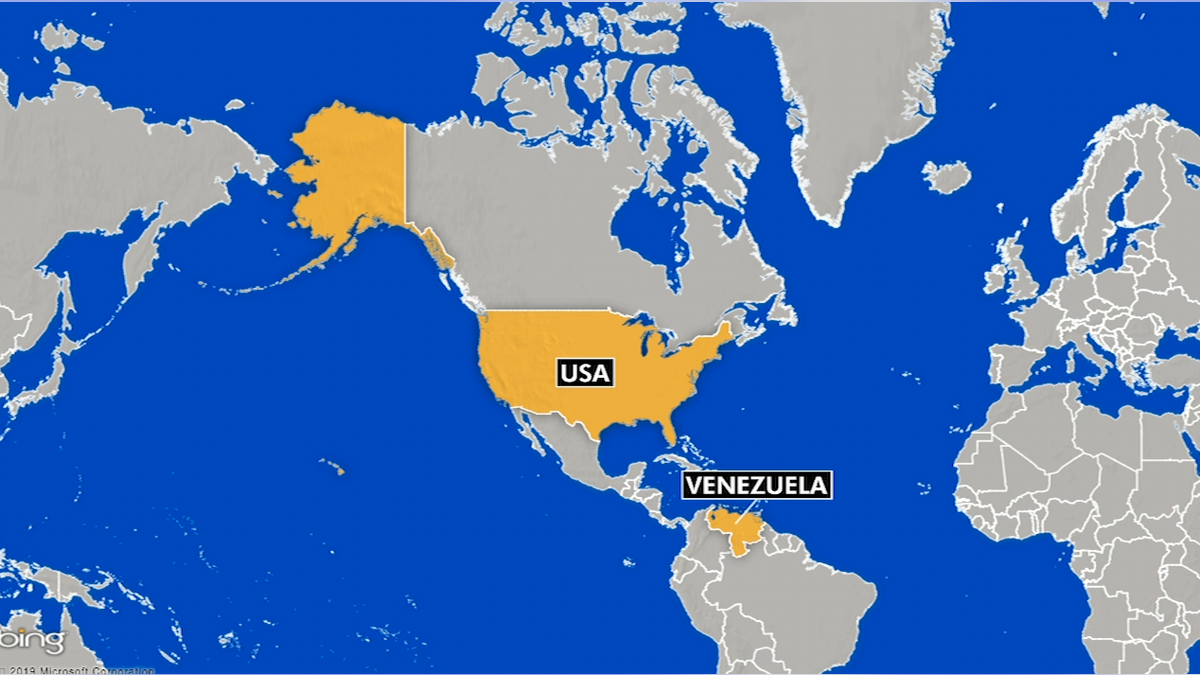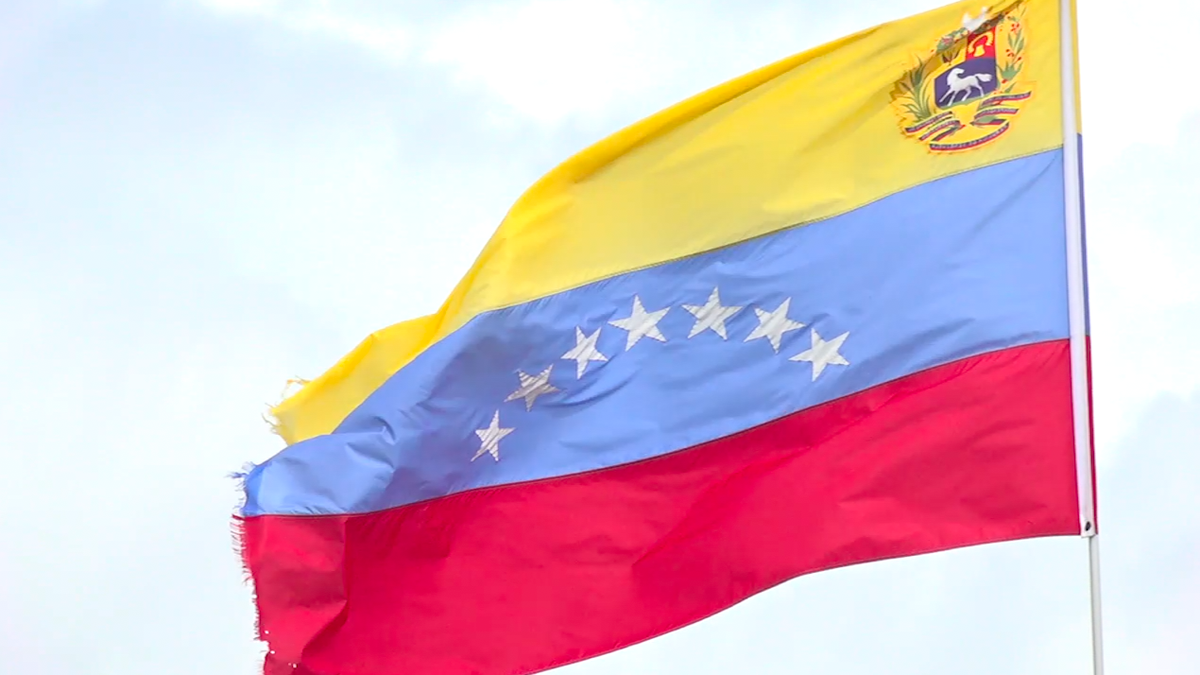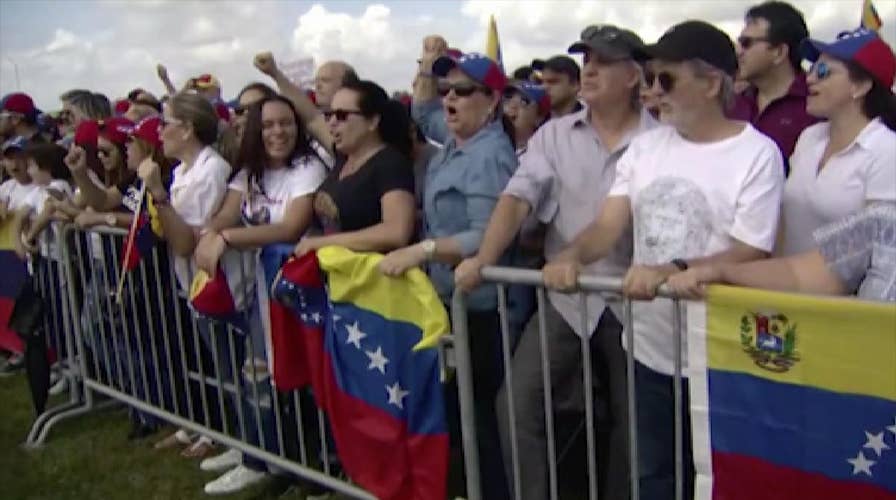DORAL, Fla. -- For the first time in 60 years, South Florida’s political magnifying glass is on a country other than Cuba. The unfolding humanitarian crisis in Venezuela has pulled it to the forefront of the political conversation not just in the Sunshine State, but across the country.
As the country’s problems worsen, Democratic Venezuelan-Americans question whether their party’s actions go far enough. A growing number of exiles say they feel forgotten by a new generation of outspoken, progressive Democrats, leaving them less beholden to a party they had long supported.
Issues that for years were hotly debated in an area of Miami known as "Doral-zuela" due to its vibrant Venezuelan community, have made their way to the ears of some of the most powerful lawmakers in Washington, D.C.
The Venezuelans are angry that, as the country continues to spiral, some Democrats keep calling on the U.S. to pull out of Venezuela and lift all sanctions against the government.
“This is where the Democrats have consistently dropped the ball…they have never felt like it was an important issue…it's very difficult to feel and coexist in the same party that is saying these things are so ignorant about my homeland,” said Venezuelan immigrant Helena Poleo.
Poleo attended college in the U.S. with all intentions of returning to Caracas to begin her journalism career in her family’s magazine and newspaper business, unaware that years later, in November 2017, the Venezuelan government would wedge itself between her and her dreams.
“They denied us access to paper, they would shut down our power right at print time…it just became very hostile,” said Poleo, now president of Influence Communications, Inc. in Miami. Her family also fled to the United States and now runs the publications online from Miami.
“We have a newsroom in Venezuela but it's been very difficult these past few days. They haven't had power, they haven't had Internet,” she said.
Democratic Representatives Ro Khanna, Ilhan Omar and Tulsi Gabbard are opposing the Trump administration’s decision to recognize 35-year-old opposition leader Juan Guaidó as president of Venezuela, impose oil sanctions and refuse to rule out military action against denounced lefist-president, Nicolás Maduro.
New York freshman congresswoman Alexandria Ocasio-Cortez, a self-proclaimed Democratic-socialist, has described U.S. strategy in impoverished Venezuela as “counterproductive,” siding with Vermont Sen. Bernie Sanders in refusing to denounce the Maduro regime, prompting harsh backlash from both sides of the political aisle.
The U.S. was the first country to recognize Guaidó as the legitimate president of Venezuela, prompting over 60 other nations to follow suit. The United Nations continues to recognize Maduro, although it has called for talks, as roughly 50-member nations have vowed to support him, including China, Cuba, Iran, North Korea, Russia and Syria.
“A lot of folks…are frankly taken aback by this expression of solidarity by the Left to the military regime…they wonder how it's possible,” said Cuban-American Congressman Mario Díaz-Balart, R-Miami. “If you look at Venezuela, it's hard not to understand that socialism…has destroyed it.”
Luigi Boria, who moved to the U.S. from Venezuela with his wife and kids in 1989, agrees. He said he doesn’t understand how elected officials could come to his community of exiles, many having experienced socialism first-hand, to tout those policies.
“This is something that's scares me coming from Venezuela…we need the United States because we love this country. This is a great country. And we came here looking for help…and we don't want that to get thrown out like what happened in Venezuela,” said Boria, the former mayor of Doral, home to the largest concentration of Venezuelans in Miami.
CLICK HERE TO GET THE FOX NEWS APP
But some Venezuelans are not entirely content with the Republican approach either. They said they want the president to pair tough talk abroad with action at home.
“I think Venezuelans are confused a little bit…on the one hand, we do have sort of a tough-talking administration that seems to take this issue very seriously and they appreciate that. But on the other hand…If we are recognizing the fact that there's a crisis happening in Venezuela it seems that it would be the appropriate thing to extend some kind of protection to people who are in this country right now and not deport them back to a country that is living through what Venezuela is living through,” said Maurizio Passariello, a Venezuelan-born Democratic strategist.
Although the Trump administration has criticized the Venezuelan regime and expressed support for its citizens, it has not granted legal status to immigrants fleeing to Florida, Texas and other states. While rare for the U.S. to grant legal status to those escaping a regime, it was granted for Cubans until 2017.
Florida’s Republican Cuban-American Sen. Marco Rubio is working with top Senate Democrats on temporary protected status legislation.
From 2017 to 2018, Venezuela had more U.S. asylum applications than any other country.
Immigration from the country, which is home to 31 million people, increased by 21 percent, or almost 61,000 people, between 2016 and 2017, the largest significant increase in immigrants from one country that year, according to the Migration Policy Institute. In the last three years, over 100,000 Venezuelans have settled in Florida.

Worsening hardships in Venezuela have tightened the link between the country and its exiles in the United States. (Fox News)
Poleo said those members of Congress speaking out against U.S. intervention don’t speak for the whole party, arguing South Florida’s three Democratic Congresswomen—Donna Shalala, Debbie Wasserman Schultz and Debbie Mucarsel-Powell—are among the strongest supporters of the administration’s campaign to overthrow the Maduro government. They have also been quick to distance themselves from some of the far-left Democratic lawmakers commenting on this issue.
Shalala has insisted that Sen. Sanders’ positions were not reflective of those held by most Democrats.
"I'll make it clear, @SenSanders does not reflect the majority of the Democratic Party and our support for Venezuela's interim president @jguaido and the Venezuelan people," Shalala tweeted. "Maduro is a dictator and must go."
She and Rep. Wasserman-Schultz also traveled to the Venezuela-Colombia border, where Maduro's government had set up barriers to prevent humanitarian aid from entering the country.
“Our local Democratic leaders have been very vocal…but the rest of the country, the Democrats seem to be very ill-informed…so they are themselves fueling this,” Poleo said.
That position could give President Trump an edge with Latino voters in 2020 in one of the country’s largest swing states and home to its highest concentration of Venezuelans.
Nearly 17 percent of Florida’s registered voters are Hispanic, a group that includes Venezuelans, Cubans, Puerto Ricans, Colombians and Nicaraguans, among others. In a state that Trump won by 113,000 votes in 2016, the Latino vote can make or break an election.
The issue is already taking center stage on the 2020 campaign trail with most candidates asked about their position on the crisis. California Sen. Kamala Harris has called for free elections and humanitarian aid to be allowed in Venezuela while Sens. Kirsten Gillibrand, Cory Booker, Amy Klobuchar, along with former Vice President Joe Biden have affirmed their support of Guaidó as the legitimate leader of Venezuela.
“This is really not about ideology…there is actually a humanitarian crisis happening in Venezuela,” said Passariello. “There's a lack of medicine, there's a lack of food and an out of control refugee crisis.”
In a February anti-socialism speech to a South Florida crowd of mostly political asylum-seekers, President Trump said, “The days of socialism and communism are numbered…not only in Venezuela but in Nicaragua and in Cuba, as well.”

(Fox News)
“We already saw the Republicans using the socialist term against Democrats and connecting them to a regime. This is completely wrong and it's completely a wrong connection,” said Poleo. “But it's a connection that works and it's all about buzzwords. So it definitely works.”
Still, Republicans insist their anti-socialist message will help them in 2020.
“This could be what the Bay of Pigs was for Cuban voters…This could be a one-issue situation where even if you are a Democrat you vote for a Republican because they've been supportive of this,” said Poleo, adding that Venezuelans have found a support system in South Florida’s Cuban exile community since arriving to the U.S.
Díaz-Balart said the socialist-leaning positions of some Democrats could leave the party with the possibility of a new generation of Republican Venezuelan-Americans as the Cuban-Americans experienced in the 1960s.
Michael Touchton, a political science professor at the University of Miami, said the political impact could last for years, even decades.
“Just like with the Cuban-American population, I see an opportunity to take that political support for a generation or more,” said Touchton. “Many other members of Latino communities that are sympathetic…will be interested to see how this scenario is resolved or not resolved up to the 2020 election…so it might be more votes on the line than we think… these issues could reverberate well beyond the Venezuelan community.”













































